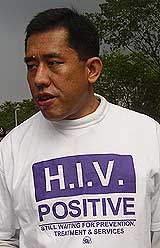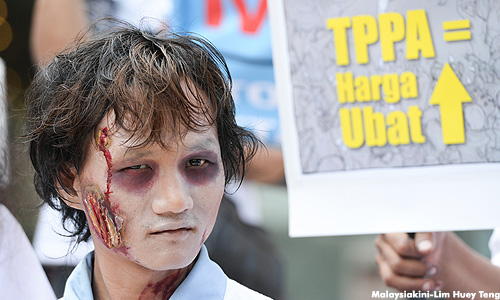Parliaments in Asia Pacific must reject the Trans-Pacific Partnership Agreement (TPPA) as it is likely to extend patents and endager the lives of "hundreds of thousands" relying on crucial life-prolonging medications, advocates for people living with HIV/AIDS urge.
While the TPPA text set on Monday is still under wraps, the groups say leaks indicate it favours medical monopolies through extended patents on crucial drugs.
"APN+ members are in 6 of the TPPA countries - Malaysia, Vietnam, Singapore, Australia, New Zealand and Japan - and will be among the first to face the consequences of the TPP on their health and lives...
“Any trade agreement that further strengthens the hands of the multinational pharmaceutical industry to play games with the lives and health of millions of patients in the Asia-Pacific region is immoral and unacceptable,” said Shiba Phurailatpam of Asia-Pacific Network of People living with HIV/AIDS (APN+)
 Edward Low
(photo)
of Positive Malaysian Treatment Access & Advocacy Group (MTAAG+) said intellectual property policy changes in the US had led to pricier cancer treatment and medication to treat Hepatitis C.
Edward Low
(photo)
of Positive Malaysian Treatment Access & Advocacy Group (MTAAG+) said intellectual property policy changes in the US had led to pricier cancer treatment and medication to treat Hepatitis C.
In the Asia-Paficic region, he said, second and third line AIDS medicines are "exorbitantly-priced" due to WTO’s Trade-Related Aspects of Intellectual Property Rights (Trips) Agreement that require 20 year monopolies on medicines in Malaysia.
"Now, 20 years after Trips, the next generation of international intellectual property obligations pushed by the US through the TPP would keep even more medicines unaffordable for longer periods of time,” he said.
The groups expect the final TPP text to contain intellectual property provisions which exceed existing agreements in developing countries like Vietnam and Malaysia under the World Trade Organisation which allows nations to adjust Trips to safeguard public health.
They say the TPPA is likely to negate flexibility offered in what is referred to in Trips-plus, given the intellectual property provisions pushed by the US following strong lobby by multinational pharmaceutical industry.
"The TPPA likely does away with many of these Trips flexibilities by requiring longer patent terms, data and marketing exclusivity, patents on new forms and new uses of known medicines, harsh patent enforcement provisions and investment provisions that will allow MNCs to sue governments for pro-health policies," they said.
Two-thirds will be untreated
Leaks on the TPPA negotiations showed countries like Australia pushing back on the US proposal for a 12-year period of exclusivity for biological medicines, but the advocates say even a five-year exclusive period will do harm.
"But even a mandatory 5-year period of exclusivity along with the several other restrictive conditions imposed by the US, will have a massive adverse impact in countries like Malaysia and Vietnam as will the other damaging provisions in the intellectual property chapter.
 The conclusion of this trade deal makes a mockery of the Sustainable Development Goals and the new WHO HIV treatment guidelines that call for immediate initiation of treatment." Shiba Phurailatpam of APN+ added.
The conclusion of this trade deal makes a mockery of the Sustainable Development Goals and the new WHO HIV treatment guidelines that call for immediate initiation of treatment." Shiba Phurailatpam of APN+ added.
Higher cost of medicine coupled with pull back by international aid agencies in Vietnam could leave about two-thirds of those living with HIV/AIDS without access to treatment.
"With the new HIV treatment guidelines from the WHO, the TPP’s impact for people living with HIV will be even more severe. This is an unthinkable scenario for us,” VNP+'s Do Dang Dong said.
The Malaysian government will reveal the TPPA text within one month.
The government earlier said it will not agree to provisions which will make healthcare costlier for Malaysians.
Related reports
TPPA nitty-gritty to be disclosed in a month

